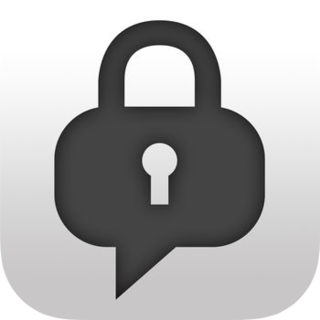
GNU is an extensive collection of free software, which can be used as an operating system or can be used in parts with other operating systems. The use of the completed GNU tools led to the family of operating systems popularly known as Linux. Most of GNU is licensed under the GNU Project's own General Public License (GPL).
Pretty Good Privacy (PGP) is an encryption program that provides cryptographic privacy and authentication for data communication. PGP is used for signing, encrypting, and decrypting texts, e-mails, files, directories, and whole disk partitions and to increase the security of e-mail communications. Phil Zimmermann developed PGP in 1991.

GNU Privacy Guard is a free-software replacement for Symantec's PGP cryptographic software suite. It is compliant with RFC 4880, the IETF standards-track specification of OpenPGP. Modern versions of PGP are interoperable with GnuPG and other OpenPGP-compliant systems.

John Gilmore is one of the founders of the Electronic Frontier Foundation, the Cypherpunks mailing list, and Cygnus Solutions. He created the alt.* hierarchy in Usenet and is a major contributor to the GNU Project.

Werner Koch is a German free software developer. He is best known as the principal author of the GNU Privacy Guard. He was also Head of Office and German Vice-Chancellor of the Free Software Foundation Europe. He is the winner of Award for the Advancement of Free Software in 2015 for founding GnuPG.

Enigmail is a data encryption and decryption extension for Mozilla Thunderbird and the Postbox that provides OpenPGP public key e-mail encryption and signing. Enigmail works under Microsoft Windows, Unix-like, and Mac OS X operating systems. Enigmail can operate with other mail clients compatible with PGP/MIME and inline PGP such as: Microsoft Outlook with Gpg4win package installed, Gnome Evolution, KMail, Claws Mail, Gnus, Mutt. Its cryptographic functionality is handled by GNU Privacy Guard.
In cryptography, Camellia is a symmetric key block cipher with a block size of 128 bits and key sizes of 128, 192 and 256 bits. It was jointly developed by Mitsubishi Electric and NTT of Japan. The cipher has been approved for use by the ISO/IEC, the European Union's NESSIE project and the Japanese CRYPTREC project. The cipher has security levels and processing abilities comparable to the Advanced Encryption Standard.
Scramdisk is a free on-the-fly encryption program for Windows 95, Windows 98, and Windows Me. A non-free version was also available for Windows NT.

Richard Matthew Stallman, also known by his initials, rms, is an American free software movement activist and programmer. He campaigns for software to be distributed in a manner such that its users receive the freedoms to use, study, distribute, and modify that software. Software that ensures these freedoms is termed free software. Stallman launched the GNU Project, founded the Free Software Foundation, developed the GNU Compiler Collection and GNU Emacs, and wrote the GNU General Public License.

WinPT or Windows Privacy Tray is frontend to the Gnu Privacy Guard (GnuPG) for the Windows platform. Released under GPL, it is compatible with OpenPGP compliant software.

The GNU General Public License is a series of widely used free software licenses that guarantee end users the freedom to run, study, share, and modify the software. The licenses were originally written by Richard Stallman, founder of the Free Software Foundation (FSF), for the GNU Project, and grant the recipients of a computer program the rights of the Free Software Definition. The GPL series are all copyleft licenses, which means that any derivative work must be distributed under the same or equivalent license terms. This is in distinction to permissive software licenses, of which the BSD licenses and the MIT License are widely used, less restrictive examples. GPL was the first copyleft license for general use.

The GNU Free Documentation License is a copyleft license for free documentation, designed by the Free Software Foundation (FSF) for the GNU Project. It is similar to the GNU General Public License, giving readers the rights to copy, redistribute, and modify a work and requires all copies and derivatives to be available under the same license. Copies may also be sold commercially, but, if produced in larger quantities, the original document or source code must be made available to the work's recipient.
The Free Software Foundation (FSF) is a 501(c)(3) non-profit organization founded by Richard Stallman on October 4, 1985, to support the free software movement, which promotes the universal freedom to study, distribute, create, and modify computer software, with the organization's preference for software being distributed under copyleft terms, such as with its own GNU General Public License. The FSF was incorporated in Boston, Massachusetts, US, where it is also based.

Jami is a SIP-compatible distributed peer-to-peer softphone and SIP-based instant messenger for Linux, Microsoft Windows, OS X, iOS, and Android. Jami was developed and maintained by the Canadian company Savoir-faire Linux, and with the help of a global community of users and contributors, Jami positions itself as a potential free Skype replacement.

Linux-libre is an operating system kernel and a GNU package.
eCryptfs is a package of disk encryption software for Linux. Its implementation is a POSIX-compliant filesystem-level encryption layer, aiming to offer functionality similar to that of GnuPG at the operating system level, and has been part of the Linux kernel since version 2.6.19. The eCryptfs package has been included in Ubuntu since version 9.04 to implement Ubuntu's encrypted home directory feature, but is now deprecated

GNU Health is a free/libre health and hospital information system with strong focus on public health and social medicine. Its functionality includes management of electronic health records and laboratory information management system.

Cryptocat is a discontinued open-source desktop application intended to allow encrypted online chatting available for Windows, OS X, and Linux. It uses end-to-end encryption to secure all communications to other Cryptocat users. Users are given the option of independently verifying their buddies' device lists and are notified when a buddy's device list is modified and all updates are verified through the built-in update downloader.

ChatSecure is a messaging application for iOS which allows OTR and OMEMO encryption for the XMPP protocol. ChatSecure is free and open source software available under the GNU General Public License.












